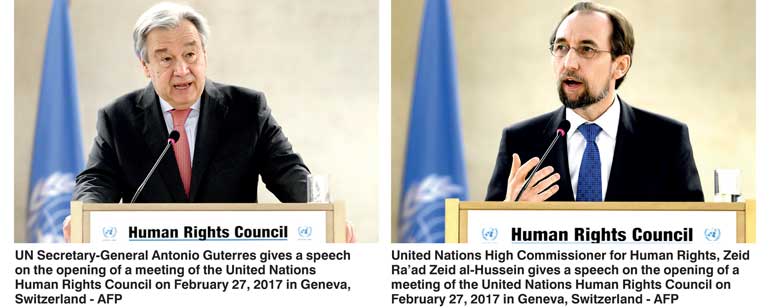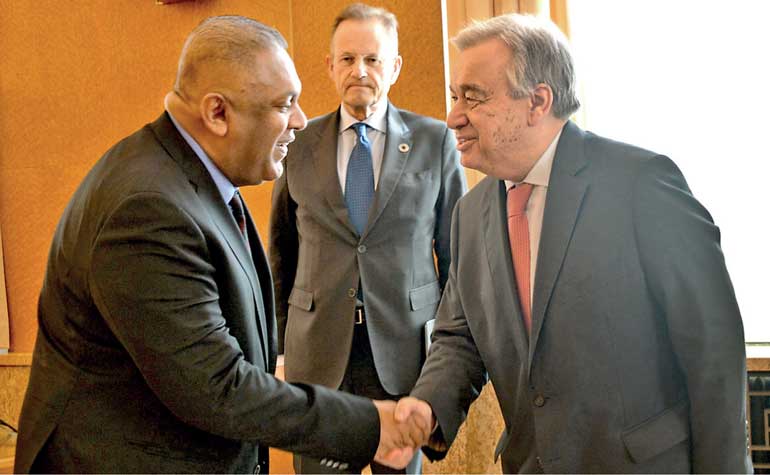A Brief Colonial History Of Ceylon(SriLanka)
Sri Lanka: One Island Two Nations
A Brief Colonial History Of Ceylon(SriLanka)
Sri Lanka: One Island Two Nations
(Full Story)
Search This Blog
Back to 500BC.
==========================
Thiranjala Weerasinghe sj.- One Island Two Nations
?????????????????????????????????????????????????Tuesday, February 28, 2017
Mangala to deliver Sri Lanka’s national statement in Geneva today
 Dharisha Bastians -Tuesday, 28 February 2017
Dharisha Bastians -Tuesday, 28 February 2017
reporting from Geneva
Foreign Minister Mangala Samaraweera will address the United Nations Human Rights Council in Geneva today, delivering a speech that will outline Sri Lanka’s reconciliation and justice efforts since 2015 and appeal for more time to deliver on its transitional justice pledges as the country reckons with its violent past.
Sri Lanka is likely to seek a two-year extended timeframe to implement recommendations contained in UNHRC resolution 30/1 which it cosponsored in October 2015. The resolution called on the Government to meet its transitional justice commitments, undertake political and security reforms and set up a judicial mechanism comprising foreign judges, lawyers and investigators to address alleged war crimes committed by Government troops and the LTTE during the conflict.
Yesterday, Minister Samaraweera held talks with UN Secretary General Antonio Guterres who was in Geneva to open the 34th Session of the Human Rights Council. Secretary General Guterres was addressing the UN Human Rights Council for the first time since taking office in January this year. It was also the Sri Lankan Foreign Minister's first meeting with the UNSG.
Minister Samaraweera briefed the Secretary General on Sri Lanka's reconciliation efforts, and Gueterres expressed his full support for the Government's reform agenda, the Foreign Minister's office said in a statement. Recalling his several visits to Sri Lanka since 1978 including as High Commissioner for Refugees, the Secretary-General said that Sri Lanka was "a country that very dear to his heart," the statement said adding that the Secretary General had indicated he would be delighted to visit the island.
The Foreign Minister is scheduled to meet with UN High Commissioner for Human Rights, Zeid Ra’ad Al Hussein today, after he delivers Sri Lanka’s national statement before the council.
Minister Samaraweera and Secretary General Tittawella will also address an event organised by the Permanent Mission of Sri Lanka to the UN on the sidelines of the UNHRC session tomorrow (1).
The Sri Lankan delegation attended the council’s opening session at the Palais des Nations yesterday. The delegation, led by Minister Samaraweera, also included Parliamentarian Dr. Jayampathy Wickremaratne, Sri Lanka’s Permanent Representative to the United Nations in Geneva, Ambassador Ravinatha Aryasinha and Secretary General of the Secretariat for Coordinating Reconciliation Mechanisms, Mano Tittawella.
The UN Human Rights Council’s 34th Session opened yesterday, even as reports over the weekend indicated that under the Trump administration, the US was considering a withdrawal from the 47- member council. The new administration in Washington was questioning the UNHRC’s usefulness and believes the body in which the US holds membership to be unfairly targeting Israel, the reports said.
Addressing the UNHRC opening session in Geneva yesterday, both UN Secretary General Guterres and High Commissioner Zeid took note of the rise of populism across the world that was threatening the international order and undermining the rights of refugees, migrant and minority communities.
“We are increasingly seeing the perverse phenomena of populism and extremism,” resulting in growing racism, xenophobia, anti-Semitism and anti-Muslim hatred, the UN secretary general said as he opened the council’s session in Geneva.
In his opening statement High Commissioner Zeid issued a clarion call to the world to protect the international order and the multilateral system and understand its importance towards maintaining world peace and protecting human dignity.
The High Commissioner’s comments before the 47-member Council were a thinly veiled broadside at the new administration in the United States.
“The unprecedented marches of 21 January this year were not, I believe, about a particular individual or government – although many saw them as such. I believe the marches were for the rights of women, the human rights of women, for all of us, for a fair and inclusive humanity,” the High Commissioner said in a reference to the post-inauguration marches in the US that were mirrored in other parts of the world.
Human Rights and the very future of the planet must not be thrown aside by “reckless political profiteers”, the High Commissioner said in his strongly worded statement.
He underscored that without a commitment to fundamental human rights, to the dignity and worth of the human person and to the equal rights of men and women and of nations large and small, the world would descend into chaos, misery and warfare.
“To those political actors who, as in the days of the league, threaten the multilateral system or intend to withdraw from parts of it, the sirens of historical experience ought to ring clear. We will not sit idly by. For we have much to lose, so much to protect,’ the UN’s top Human Rights Envoy vowed.
reporting from Geneva
Foreign Minister Mangala Samaraweera will address the United Nations Human Rights Council in Geneva today, delivering a speech that will outline Sri Lanka’s reconciliation and justice efforts since 2015 and appeal for more time to deliver on its transitional justice pledges as the country reckons with its violent past.
Sri Lanka is likely to seek a two-year extended timeframe to implement recommendations contained in UNHRC resolution 30/1 which it cosponsored in October 2015. The resolution called on the Government to meet its transitional justice commitments, undertake political and security reforms and set up a judicial mechanism comprising foreign judges, lawyers and investigators to address alleged war crimes committed by Government troops and the LTTE during the conflict.
Yesterday, Minister Samaraweera held talks with UN Secretary General Antonio Guterres who was in Geneva to open the 34th Session of the Human Rights Council. Secretary General Guterres was addressing the UN Human Rights Council for the first time since taking office in January this year. It was also the Sri Lankan Foreign Minister's first meeting with the UNSG.
Minister Samaraweera briefed the Secretary General on Sri Lanka's reconciliation efforts, and Gueterres expressed his full support for the Government's reform agenda, the Foreign Minister's office said in a statement. Recalling his several visits to Sri Lanka since 1978 including as High Commissioner for Refugees, the Secretary-General said that Sri Lanka was "a country that very dear to his heart," the statement said adding that the Secretary General had indicated he would be delighted to visit the island.
The Foreign Minister is scheduled to meet with UN High Commissioner for Human Rights, Zeid Ra’ad Al Hussein today, after he delivers Sri Lanka’s national statement before the council.
Minister Samaraweera and Secretary General Tittawella will also address an event organised by the Permanent Mission of Sri Lanka to the UN on the sidelines of the UNHRC session tomorrow (1).
The Sri Lankan delegation attended the council’s opening session at the Palais des Nations yesterday. The delegation, led by Minister Samaraweera, also included Parliamentarian Dr. Jayampathy Wickremaratne, Sri Lanka’s Permanent Representative to the United Nations in Geneva, Ambassador Ravinatha Aryasinha and Secretary General of the Secretariat for Coordinating Reconciliation Mechanisms, Mano Tittawella.
The UN Human Rights Council’s 34th Session opened yesterday, even as reports over the weekend indicated that under the Trump administration, the US was considering a withdrawal from the 47- member council. The new administration in Washington was questioning the UNHRC’s usefulness and believes the body in which the US holds membership to be unfairly targeting Israel, the reports said.
Addressing the UNHRC opening session in Geneva yesterday, both UN Secretary General Guterres and High Commissioner Zeid took note of the rise of populism across the world that was threatening the international order and undermining the rights of refugees, migrant and minority communities.
“We are increasingly seeing the perverse phenomena of populism and extremism,” resulting in growing racism, xenophobia, anti-Semitism and anti-Muslim hatred, the UN secretary general said as he opened the council’s session in Geneva.
In his opening statement High Commissioner Zeid issued a clarion call to the world to protect the international order and the multilateral system and understand its importance towards maintaining world peace and protecting human dignity.
The High Commissioner’s comments before the 47-member Council were a thinly veiled broadside at the new administration in the United States.
“The unprecedented marches of 21 January this year were not, I believe, about a particular individual or government – although many saw them as such. I believe the marches were for the rights of women, the human rights of women, for all of us, for a fair and inclusive humanity,” the High Commissioner said in a reference to the post-inauguration marches in the US that were mirrored in other parts of the world.
Human Rights and the very future of the planet must not be thrown aside by “reckless political profiteers”, the High Commissioner said in his strongly worded statement.
He underscored that without a commitment to fundamental human rights, to the dignity and worth of the human person and to the equal rights of men and women and of nations large and small, the world would descend into chaos, misery and warfare.
“To those political actors who, as in the days of the league, threaten the multilateral system or intend to withdraw from parts of it, the sirens of historical experience ought to ring clear. We will not sit idly by. For we have much to lose, so much to protect,’ the UN’s top Human Rights Envoy vowed.
Foreign Minister Mangala Samaraweera who is presently in Geneva
to participate in the High-Level segment of the 34th Session of the UN
Human Rights Council met UN Secretary-General Antonio Gueterres
yesterday. This was the first meeting of the Minister with the new UN
Secretary-General who took office in January this year. Recalling his
several visits to Sri Lanka from 1978 onwards including as High
Commissioner for Refugees, the Secretary-General said that Sri Lanka is a
country that is very dear to his heart. Minister Samaraweera briefed
the Secretary-General on recent developments in Sri Lanka in the context
of reconciliation. Expressing the full support of the United Nations
for the Government’s reform agenda, the Secretary-General expressed that
Sri Lanka is a country that is very dear to his heart and that he would
be delighted to visit.


